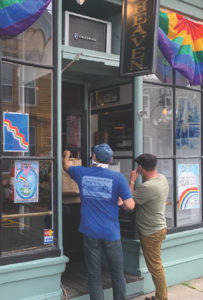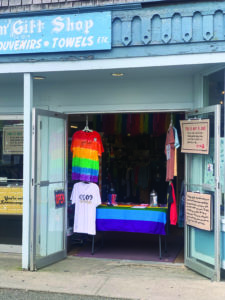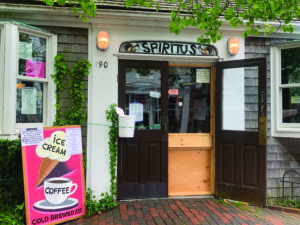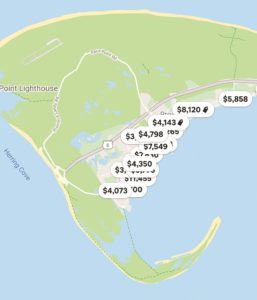At their spring town meetings in 2022, voters in Provincetown and Wellfleet adopted a “community impact fee” on investor-owned short-term rental properties: a 3-percent surcharge on bookings.
According to the explanation of Article 15 in Provincetown, it was intended to “discourage the ‘warehousing’ of apartments for short-term rentals, where developers purchase several units for the distinct purpose of renting them short-term, thereby removing them from the inventory of seasonal or year-round occupancy.”
“This fee does not apply to licensed businesses, owners who rent a single unit nor someone who rents one or two units from a property listed as the owner’s primary residence,” the town meeting booklet advised. Property owners with two or more short-term rentals would need to charge the 3-percent fee to their customers starting in January 2023.
The measure passed almost unanimously in Provincetown. In Wellfleet, articles 46 and 47 also passed, imposing the 3-percent fee and extending it to cover multiple short-term rentals that are located at an owner’s primary residence.
(Eastham had also considered voting on a community impact fee that spring, but the select board decided not to advance the article. Town Administrator Jacqui Beebe said the impact fee could have punished historic cottage-colony owners who license their properties as short-term rentals.)
A year-and-a-half later, implementation of the impact fee has been rocky. Multiple property owners wrote to the Independent to say that the state had told them, erroneously, that they should be collecting the fee, and Provincetown Assistant Town Manager Dan Riviello said that he had contacted the state Dept. of Revenue to try to learn how it was going about imposing the fee.
“I interacted with two residents who reached out to me because they noticed the impact fee was being misapplied to their rental,” Riviello said. “Airbnb didn’t get back to us at all, but I got in touch with someone at the state Dept. of Revenue who was able to reach them.”
Riviello said that, in those cases, a user-selected option that the homeowners had chosen years before when setting up their Airbnb account had somehow caused the impact fee to be triggered. “It’s in the sign-up process, and people don’t recall what choices they chose, they don’t recall what their options were, and there’s no reason to go back into those menus unless you’re setting up a new rental,” Riviello said.
Riviello said he also asked how the state was identifying which taxpayers should pay the impact fee.
“I went back to the Dept. of Revenue and said, ‘These are the people I see with multiple rental certificates. Aren’t these the people this should apply to?’ and they said, ‘Well, it’s not really that simple,’ ” Riviello reported.
“I think the rules from the Dept. of Revenue were set up for Boston-type situations, where you have a triple-decker,” Riviello added. “I think it’s a little difficult for the DOR to understand how it’s supposed to work out here.”
How Much Revenue?
Before the impact fee was passed, a list provided by the town showed 128 properties were owned by people who had two short-term rentals in town — although it was not clear how many of them might also live at those properties and therefore be exempt from the fee.
The list contained another 75 properties owned by people with between three and six short-term rentals in town. Those 203 properties represented about 20 percent of the registered and taxed short-term rentals in Provincetown at the time.
According to Finance Director Rich Bienvenue, Eastham’s numbers were similar: 179 rentals might be covered by an impact fee, he said in spring 2022, or about 19 percent of the town’s short-term rental inventory.
Wellfleet does not have a list of short-term rental properties, said select board member Ryan Curley.
Based on that 20-percent proportion, and the fact that the impact fee is only a 3-percent surcharge on bookings while the town’s short-term rental tax is a 6-percent surcharge, it would be reasonable to look for community impact fee revenue to be around 10 percent of the town’s existing rooms tax on short-term rentals.
That would be more than $200,000 per year in Provincetown, and about $160,000 per year in Wellfleet. Numbers like that have not happened, however — at least not yet.
In the first quarter in which the community impact fee existed in Provincetown, which was the first quarter of 2023, the impact fee raised only $6,957 or about 2.5 percent of what the rooms tax on short-term rentals raised that quarter.
In the second quarter, which ended on June 30, the impact fee raised $15,800 for Provincetown — 7.3 percent of what the rooms tax on short-term rentals raised.
The vast majority of the Outer Cape’s rooms tax is received in the quarters that end on Sept. 30 and Dec. 31. It should be clearer when those payments arrive whether the impact fee is bringing in revenue in line with the town’s inventory of investor-owned short-term rentals or whether the collection of the fee is still lagging.
In Wellfleet, the story is similar. Articles 46 and 47 became effective on Oct. 1, 2022, so the first quarter in which Wellfleet received community impact fee revenue was the one ending Dec. 31, 2022.
That quarter, Wellfleet received $6,298 in community impact fees — only 1 percent of the nearly $600,000 in short-term rental taxes that came in that quarter.
The next quarter, the impact fee brought in $4,165, but that was good for 4 percent of the town’s short-term rental tax revenue. In the quarter that ended June 30, 2023, the impact fee brought in $5,137, or 8 percent of the town’s rooms tax revenue.
The quarter that ends this coming Sept. 30 should be a major signal as to whether implementation of the impact fee has stabilized or whether there could be significant revenue going uncollected.
How Would We Know?
The towns are not directly involved in implementing the community impact fee, Riviello said — that job lies with the state Dept. of Revenue. Nonetheless, both Provincetown and Wellfleet have dedicated 100 percent of their community impact fee revenue toward housing, so the revenue collected is a matter of public interest.
A spokesperson for the Dept. of Revenue said that “a taxpayer or intermediary registering a short-term rental property on MassTax Connect is responsible for selecting fields that indicate the property is categorized as being subject to payment of a community impact fee.”
Intermediaries include websites like Airbnb and VRBO that collect payments and taxes for short-term rental owners.
The spokesperson also said that “municipalities that adopt a community impact fee may request that DOR verify a list of short-term rentals registered with the Department.”
The Independent asked what that “verification” process would entail, but the agency did not provide a response by press time.
Provincetown Independent summer fellow Elias Schisgall contributed reporting for this article.





